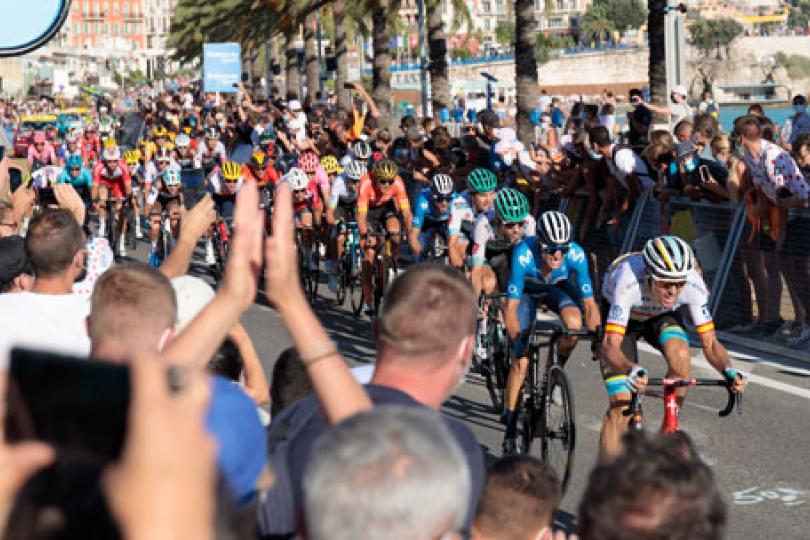Cohen's research on false positives changes Tour de France COVID-19 testing procedures
Photo: TDF Cyclists during the 2nd stage of the 2020 Tour de France , second round on Promenade des Anglais. C. Martino, CC BY-SA 4.0.
Editor's note: The following two pieces were originally published in CyclingNews. Together they tell the story of how Andrew Cohen's research on potential false COVID-19 positive test results (which we also featured) changed the way the Tour de France tested staff and riders this year.
When is a positive not a positive? COVID-19 and the Tour de France
The stakes are high for this shortened season of professional cycling. If COVID-19 spreads at the Tour de France, the consequences will be dire for the ASO, the UCI, the racing season and the population.
However, riders have already had issues with potential false COVID-19 positives and will undergo at least four PCR tests before and during the race. When, not if, a rider falsely turns up positive for the virus, the consequences will fall not on the ASO or UCI but on the teams, staff and riders.
The ASO and the UCI have meticulously prepared strict sanitary measures for the race, including pre-race monitoring and testing in hopes of keeping the virus away. But this level of sanitation counterintuitively makes interpreting a positive COVID-19 test more difficult.
Will the Tour de France have a positive? Possibly. Can we be sure one positive is accurate? Probably not.
...
Dr Andrew N. Cohen of the Center for Research on Aquatic Bioinvasions has been vocal in his criticism of ignoring the importance of false positives and the global strategy of diagnosing COVID-19 based on a single positive test in the absence of any symptoms.
His own research led him to medical literature from previous pandemics - SARS-CoV-1, MERS, Ebola. For those diseases, the World Health Organisation (WHO) and Centers for Disease Control (CDC) recommended testing only people with symptoms or known contacts with confirmed cases. For SARS-CoV-1, they specified "a single test result is insufficient for the definitive diagnosis of SARS-CoV infection".
That all changed with COVID-19.
"The more data we get, the clearer that seems to be. Some of this is coming from the sports world, but a lot of it is coming from other places where people do a second test and check positive results, and they find a substantial portion of them are false positive," Cohen tells Cyclingnews.
"What we're saying is certainly out of the mainstream for what has been said for SARS-CoV-2, but it's completely in the mainstream for what the CDC and WHO and medical professionals have said up through 2019 about using PCR-based diagnostic tests, which is that they have a certain rate of false-positives, you need to watch out for them."
Tour de France to carry out secondary COVID-19 testing to avoid false positives
The UCI has made a last-minute update to its COVID-19 medical protocol to help avoid the risk of false positive cases and the possible expulsion of riders and teams during the Tour de France and other Grand Tours.
A spate of apparent false positives has forced several riders and teams to miss races and teams were concerned about a Tour de France rule that forced a whole team to quit the race if two of their 30 riders or staff tested positive.
A special investigation by Laura Weislo for Cyclingnews highlighted how false positives can occur and why follow-up tests are vital to eliminate them.
After a series of meetings between the UCI, teams and the Tour de France organiser ASO, the 'two-strike, team out' rule has been changed and now only applies if two riders (not staff) test positive within a seven-day period.
